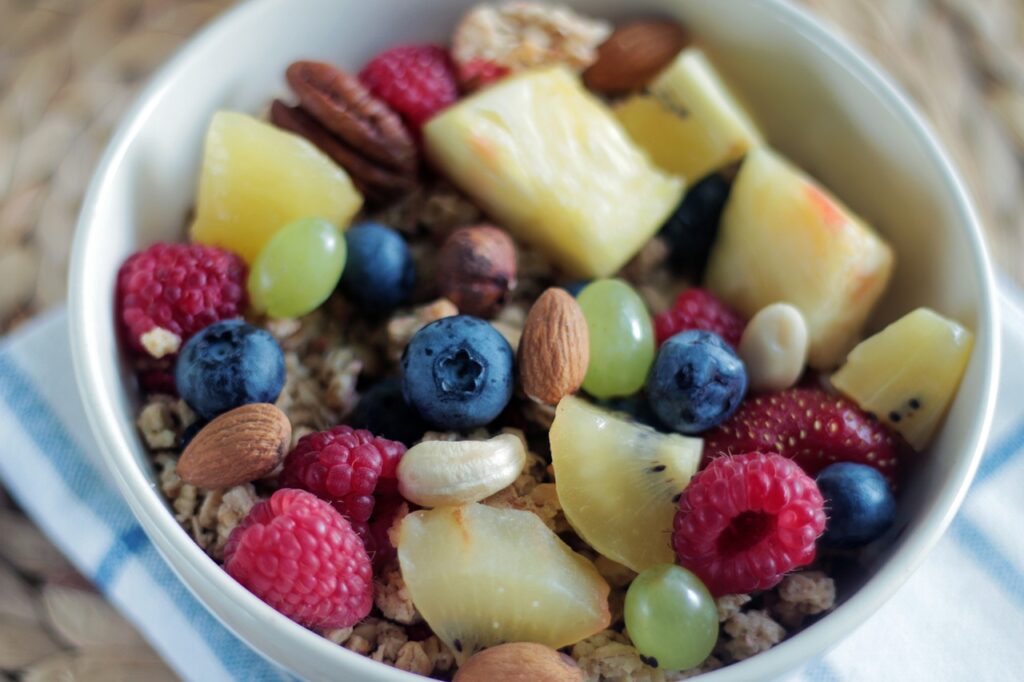When you're choosing between the gluten-free diet and the caveman lifestyle, also known as the Paleo diet, it's vital to understand their core differences and unique benefits. The Paleo diet, with its strict exclusion of grains, legumes, and dairy, offers rapid weight loss but demands careful planning to avoid nutrient deficiencies. On the other hand, the gluten-free diet primarily cuts out gluten and may not provide notable advantages unless you have gluten sensitivity. How do these diets stack up with regard to nutritional benefits, weight loss potential, and long-term sustainability? Let's explore. Both diets emphasize the consumption of whole, unprocessed foods, such as lean meats, fruits, vegetables, nuts, and seeds, which can contribute to improved overall health. However, the Paleo diet may be more challenging to sustain in the long run due to its strict limitations, while the gluten-free diet can be more accommodating to different dietary preferences and cultural cuisines. Additionally, incorporating nutritious options like crispy chickpea snacks can be a great way to add variety and texture to both diets while still adhering to their principles of whole, natural ingredients.
Overview of Paleo Diet
The Paleo diet, often called the "caveman diet," focuses on eating foods that were available to our ancient ancestors. You'll adhere to Paleo principles by consuming whole, unprocessed foods like lean meats, fish, fruits, vegetables, nuts, and seeds—essentially what could be hunted or gathered thousands of years ago. This approach to ancestral eating aims to mimic the diet of hunter-gatherers to promote peak health.
By avoiding modern processed foods, grains, legumes, and dairy, you reduce the intake of artificial additives, preservatives, and refined sugars. These changes can potentially lead to benefits like improved digestion, better blood sugar control, and increased energy levels. Following the Paleo diet means embracing a lifestyle that prioritizes nutrient-dense, natural foods that fuel your body more efficiently.
You'll also find that the Paleo principles encourage a deeper connection with the food you eat. By focusing on quality, sustainably sourced ingredients, you're not just nourishing your body but also supporting ethical farming practices. As you adopt this ancestral eating pattern, you might notice an overall enhancement in your well-being, reflecting the health and robustness of our ancient ancestors.
Understanding Gluten-Free Diet
While the Paleo diet emphasizes ancestral eating habits, the gluten-free diet focuses on eliminating gluten—a protein found in wheat, barley, and rye—from your meals. If you have gluten intolerance or gluten sensitivity, consuming gluten can lead to uncomfortable symptoms like bloating, diarrhea, and abdominal pain. For some, especially those with celiac disease, gluten can severely damage the small intestine, leading to more serious health issues.
Adopting a gluten-free diet means you'll need to carefully read food labels and be vigilant about cross-contamination. Gluten is often hidden in processed foods, sauces, and even some medications. By removing gluten from your diet, you're likely to consume more whole foods like fruits, vegetables, lean proteins, and gluten-free grains like quinoa and rice.
It's important to note that a gluten-free diet isn't inherently healthier for everyone. If you don't have gluten intolerance or gluten sensitivity, eliminating gluten doesn't offer special health benefits and could potentially lead to nutrient deficiencies if not managed properly. Always consult a healthcare provider before making significant dietary changes to verify you're meeting all your nutritional needs.
Nutritional Benefits Compared
When comparing the nutritional benefits of various diets, it's pivotal to ponder how each one impacts overall health and well-being. A gluten-free diet primarily helps individuals with celiac disease or gluten sensitivity. By removing gluten, you can reduce gut inflammation and improve gut health. This diet often leads to better nutrient absorption and a decrease in digestive discomfort. However, it's necessary to guarantee you're getting enough fiber and nutrients that are typically found in whole grains.
On the other hand, the Caveman lifestyle, also known as the Paleo diet, focuses on consuming foods that our ancestors supposedly ate. This means lots of lean meats, fish, fruits, and vegetables, while excluding processed foods, grains, and dairy. The gut health benefits of this diet come from its emphasis on whole, unprocessed foods that are easier to digest. Additionally, the Paleo diet can reduce inflammatory responses due to its avoidance of processed sugars and artificial additives.
While both diets have their merits, it's imperative to choose one that aligns with your specific health needs. Always consult with a healthcare provider before making significant dietary changes to confirm you're meeting your nutritional requirements.
Weight Loss Potential
For anyone looking to shed some pounds, evaluating the weight loss potential of different diets is crucial. When it comes to the gluten-free diet, you might not see rapid results right away. This diet focuses on eliminating gluten, and while it can help you make healthier food choices, weight loss isn't always guaranteed. People often turn to gluten-free options believing they'll lose weight, but necessary to be cautious of processed gluten-free products that can be high in sugar and calories.
On the other hand, the caveman lifestyle, or Paleo diet, tends to deliver more rapid results. By focusing on whole foods like lean meats, fruits, and vegetables while cutting out processed foods, you're likely to see quicker drops in weight. This can provide lasting motivation to stick with the diet. The Paleo approach emphasizes high protein and low-carb intake, which can help accelerate fat loss and improve muscle tone.
Health Risks and Concerns
Considering health risks and concerns is essential when choosing a diet. If you're thinking about a gluten-free diet, you should know it can benefit those with autoimmune disorders like celiac disease. For these individuals, consuming gluten can lead to severe gut inflammation, causing discomfort and long-term health issues. However, if you don't have gluten sensitivity, cutting out gluten might not provide significant benefits and could even lead to nutrient deficiencies if not managed carefully.
On the other hand, the caveman or Paleo diet emphasizes whole, unprocessed foods, which can reduce gut inflammation and promote a healthier digestive system. But it's not without its risks. For example, the high intake of meat in the Paleo diet could increase your risk of heart disease due to high saturated fat levels. Additionally, avoiding dairy and grains might lead to a lack of essential nutrients like calcium and fiber, which are essential for overall health.
Both diets have their pros and cons, so it's pivotal to weigh your unique health needs. Always consult with a healthcare professional before making significant dietary changes, especially if you have underlying health conditions.
Lifestyle and Accessibility
Jumping into a new diet isn't just about what you eat; it's also about how it fits into your daily life. When considering a gluten-free or caveman (Paleo) lifestyle, think about your daily routines and how these diets will integrate. Social media influence can make both diets seem glamorous, but reality check: you'll need practical solutions for everyday challenges.
For a gluten-free diet, accessibility is relatively high. Grocery stores now offer a wide range of gluten-free products, and many restaurants label gluten-free options on their menus. It's easier to find recipes and meal plans online, thanks to social media influencers who share their gluten-free journeys.
On the other hand, the Paleo lifestyle emphasizes whole foods like meats, fruits, and vegetables. While you won't rely on specialized products, meal prep can be time-consuming. Your social media feed might be full of exotic Paleo dishes, but fitting them into a busy schedule isn't always easy. You'll need to plan your shopping and cooking to stick to this diet.
Ultimately, both diets require adjustments to your daily routine. Understanding their accessibility and how they fit into your lifestyle will help you make a more practical choice.
Long-Term Sustainability
While venturing on a new diet can be exciting, the real challenge lies in maintaining it for the long haul. The long-term sustainability of a diet hinges on your ability to integrate it seamlessly into your lifestyle. Let's break down how the gluten-free and caveman (Paleo) diets fare in this regard.
For the gluten-free diet, habit formation can be straightforward if you have a medical necessity like celiac disease. You'll find it easier to commit since the health consequences of straying are immediate and severe. However, social stigma can be a hurdle. Dining out or attending social events might make you feel like the odd one out, complicating your commitment.
On the other hand, the caveman lifestyle encourages you to eat like our ancestors, focusing on whole foods. Habit formation can be challenging due to the restrictive nature of the diet—no grains, legumes, or processed foods. Yet, it's generally more socially acceptable compared to gluten-free, as it doesn't carry the same medical connotations. Still, you'll need a strong support system to help navigate social settings and maintain your dietary choices.
Both diets demand a high level of commitment and planning, but the key to long-term sustainability lies in overcoming social stigma and solidifying habit formation.
At a Glance
Choosing between the Paleo and gluten-free diets depends on your personal health needs and lifestyle preferences. If you're targeting rapid weight loss and prefer a high-protein intake, the Paleo diet might be for you. However, it requires careful planning to avoid nutrient deficiencies. On the other hand, the gluten-free diet is less restrictive but may not benefit you unless you have gluten sensitivity. Both have their pros and cons, so consider your goals and consult a healthcare professional.




